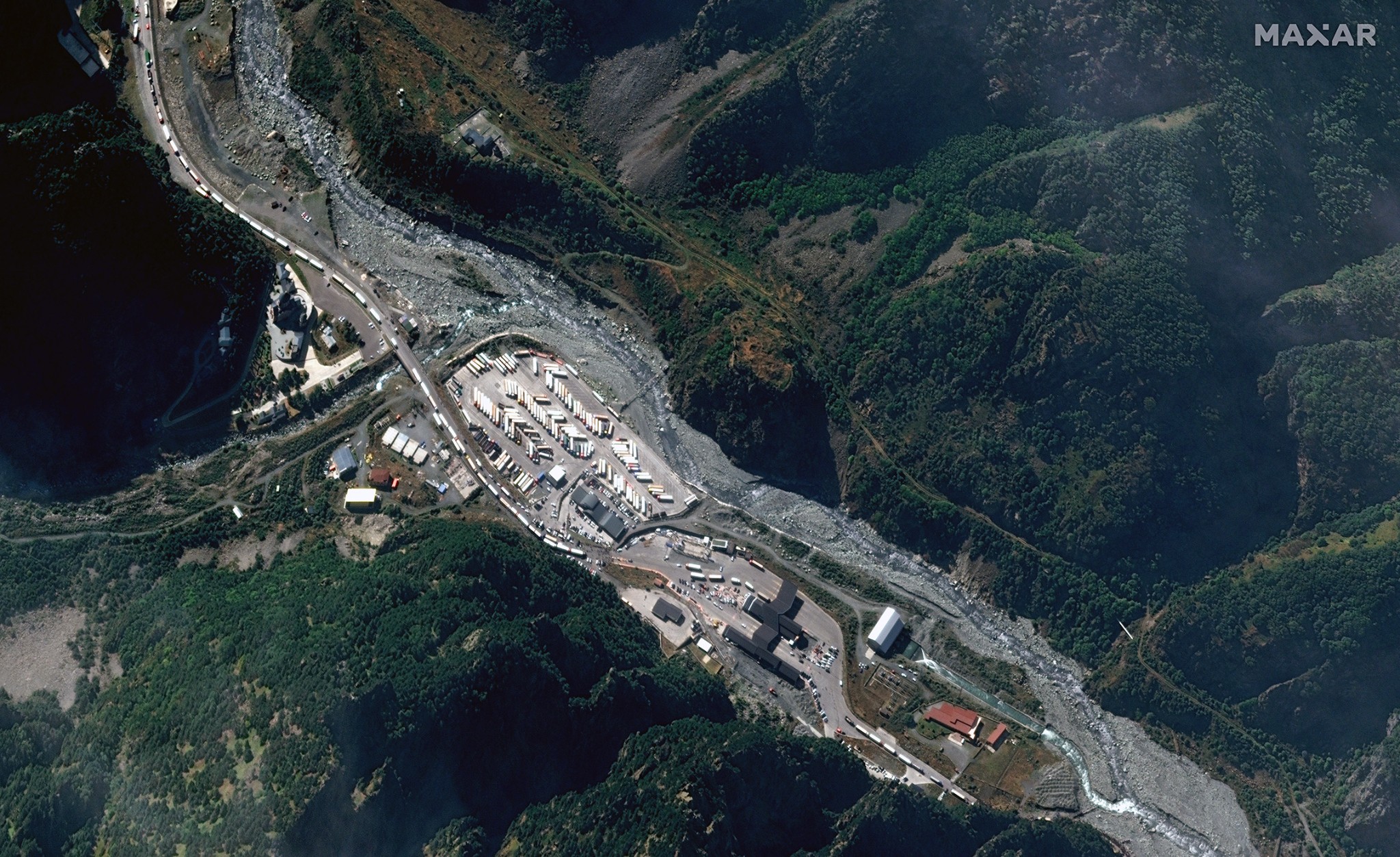 Large traffic jam on the Russian-Georgian border on September 27, 2022. Photo from Maxar Technologies' twitter.
Large traffic jam on the Russian-Georgian border on September 27, 2022. Photo from Maxar Technologies' twitter.
Why the EU Should Accept Russian Refugees
Since the invasion of Ukraine in February, Russia has seen mass emigration, as thousands of ordinary Russians attempt to escape potential conscription. However, while emigration was a preexisting phenomenon, the Kremlin’s announcement of a partial mobilization on September 21 has triggered another exodus of Russians who are desperate to avoid being mobilized. Within the first two weeks following the partial mobilization, 700,000 Russians left the country. They are not necessarily receiving support from Europe, though. The European Union’s (EU) reaction to Russian asylum seekers has varied greatly by country, with different regions showing decidedly different attitudes towards Russian refugees. For example, the Baltic States, which share land borders with Russia, have made it unequivocally clear that they will not accept Russian refugees. Finland has also barred Russians holding tourist visas from entering the country. Alternatively, Germany is working to establish a framework to offer Russian refugees asylum.
While the opposition from countries like the Baltic states and Finland is understandable given their respective histories and land borders with Russia, the German position is better for European and international security. European states should provide Russians fleeing mobilization with asylum for four reasons:
- Weakening Russia in both the short and long term.
- Countering Putin’s narratives about the nature of the conflict.
- Trapped asylum seekers are unlikely to cause regime change in Russia in any case.
- It is immoral to deny them entry simply because they are Russian.
Facilitating Russian emigration has the potential to weaken the Kremlin’s strategic position. In the short term, any military-age male who leaves Russia cannot be drafted and sent to Ukraine. Allowing these individuals to flee from Russia will reduce the Kremlin’s ability to continue the war and to try and cement Russia’s territorial gains. In the long term, draining important sections of Russia’s population will weaken Russian society and the country’s economy. Demographic data shows that the individuals fleeing Russia have been predominantly young, educated, and wealthy. Losing them would be a major blow to the viability of Russia’s economy, its demographic future, and its ability to develop high-tech industry and be competitive with the West.
As military developments in Ukraine have turned against Russia, Putin has increasingly sought to present the conflict as not just a war with Ukraine, but rather as an existential conflict with NATO and the collective West. Denying people fleeing Putin’s regime asylum feeds into this narrative that the West is anti-Russian and that there can be no reconciliation or coexistence. If Russians look towards Europe and see attitudes and policies that reinforce Kremlin narratives, it could lead Russians to believe that despite Putin’s shortcomings, his regime and his war are necessary evils in order to survive against a hostile West. By offering Russians asylum and protection from mobilization, the West can undercut Putin’s domestic justification for continuing and escalating the war and demonstrate that it opposes Putin and his regime rather than Russia as a whole.
A key part of the argument against allowing draft-dodgers to flee Russia is that they should instead stay behind and topple Putin. Prominent figures like Andrij Melnyk, the Ukrainian Ambassador to Germany, make this argument. This will not happen. Putin has spent twenty years insulating himself against the possibility of regime change. Moreover, according to political science research on protests and regime change, successful popular uprisings need to involve approximately 3.5 percent of the population. In Russia, that would be slightly over 5 million people, which is orders of magnitude larger than anything that has been seen since February. Denying asylum to people fleeing the draft will not change that.
Finally, Russia is authoritarian, and thus the population has minimal say in the actions of its government. The people cannot and should not be blamed for the actions of Putin and the Russian leadership, something countries such as Germany and France have acknowledged. To place the blame for the war in Ukraine on normal Russians, and to punish them collectively for something they cannot control, is immoral.
Although it is tempting to punish Russia by denying its citizens access to Europe and asylum, this would be an overall counterproductive strategy. There are no significant benefits to denying Russian draft-dodgers entry to Europe, while encouraging their exit from Russia has significant advantages. As the war continues, it is unlikely that the exodus from Russia will stop. Europe therefore needs to develop a coordinated and unified approach on how to handle this issue going forward. That approach should be to enable Russians to escape Russia.





